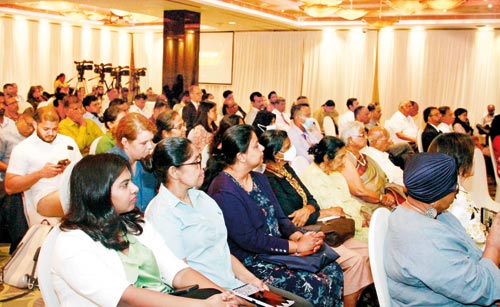Sri Lanka now in an economic recovery phase

Audience at the event.
While Sri Lanka has made good progress in addressing serious challenges facing the economy in a year, the country is now in an economic recovery phase. Some difficult reforms have been implemented and economic recovery has started, says World Bank, Country Director for Maldives, Nepal and Sri Lanka, Faris Hadad- Zervos.
Mr. Hadad- Zervos made these remarks during an event organized by the Sri Lanka Press Institute (SLPI) titled ‘Towards Sri Lanka’s Recovery: Green, Resilient and Inclusive Development’ held at the Hilton Colombo last Tuesday.
He said, “In just one year, Sri Lanka has made good progress in addressing serious challenges facing the economy. The country is now in an economic recovery phase. Some difficult reforms have been implemented and economic recovery has started.” The government has committed to an ambitious reform agenda and implemented some difficult and necessary reforms, including tax reforms, cost-reflective utility pricing, a stronger social safety net, and debt restructuring to stabilize the economy, he added.
Market interest rates are declining as the uncertainty over domestic debt restructuring wanes and the foreign exchange liquidity has also improved, he stated while stressing, “This is not the end of the road. The path to recovery is long and Sri Lanka must stay on course. The next two years will be critical for Sri Lanka’s recovery. There are further significant headwinds that need to be closely monitored.”
A prolonged debt restructuring is the key downside risk which would lead to greater uncertainty. Slow or uneven implementation of the reform agenda could further delay the recovery process and the return of confidence in the Sri Lankan economy. The volatile global economic environment is another source of risk. Continued elevation or a further increase in commodity prices could make it more difficult to buy essential goods and a global economic contraction could delay the nascent recovery of tourism in Sri Lanka and reduce demand for exports, noted Mr. Hadad-Zervos.
He also mentioned that the financial sector needs to be carefully monitored, given high exposures to the public sector, rising non-performing assets, and tight liquidity conditions.
There are strong concerns about the scarring effects of the crisis on growth, income, and jobs going forward. As the crisis continues, highly-skilled people may leave the country. Families in difficulty are likely to take children out of school. Companies may sell assets that are essential for businesses to stay afloat. These negative coping mechanisms will eventually lower the capacity of the country to grow and generate more jobs and income. The social protection reform must be carefully implemented to prevent the poor and the vulnerable from falling deeper into poverty.
Mr. Hadad- Zervos highlighted five things Sri Lanka must do on its path to recovery: Sri Lanka must shift to a more productive and outward-looking economy; transform economic governance to prevent another crisis; address competitiveness constraints and governance issues posed by stated owned enterprises; continue to strengthen the country’s social protection system to improve coverage and enhanced protection of the poor and vulnerable, including from future shocks; and prioritise investments in human capital.
For Sri Lanka, what’s really needed is to follow through reforms with actual implementation. “The crisis provides a unique opportunity to implement deep and permanent structural reforms that may be difficult in normal circumstances. But we are now in a race against time. Sri Lanka cannot face another crisis of this nature and must make the best of this opportunity to build a strong economy that can withstand future shocks,” noted Mr. Hadad-Zervos.
Sunday Island Editor and SLPI board member Manik de Silva made the welcome remarks while Sunday Times Business Editor Feizal Samath moderated the discussion.
Hitad.lk has you covered with quality used or brand new cars for sale that are budget friendly yet reliable! Now is the time to sell your old ride for something more attractive to today's modern automotive market demands. Browse through our selection of affordable options now on Hitad.lk before deciding on what will work best for you!


